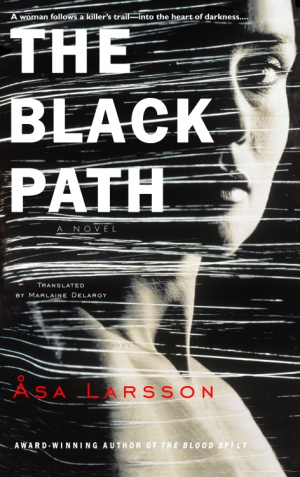
EURO CRIME
Reviews

Larsson, Asa - 'The Black Path' (translated by Marlaine Delargy)
Paperback: 400 pages (July 2008) Publisher: Delta ISBN: 0385341016
If you like Scandinavian crime fiction, and in the main I do, you can be pretty sure you are in for a treat when a book from this notably introspective region has the title THE BLACK PATH. This novel is indeed superb: it is the third in the series featuring lawyer Rebecka Martinsson.
At the start of the book, Rebecka is again traumatised (as she was at the start of the second) by the climactic events of the previous novel. She is in a much worse state this time, being hospitalised in a psychiatric clinic for some months, then having to undertake outpatient therapy, then deciding to resign from her job in a major Stockholm law firm (partly, but not only, because she despairs of her boss, Mans, ever showing any interest in her). She takes a job as a prosecutor specialising in financial crime in Kiruna, the village where she was bought up and the main location of the previous two novels. Here, Rebecka can work in solitude to her heart's content, blanking out her sad childhood, her empty present life, and living in the only place where she feels at home - her grandmother's house (which she owns), sharing what little companionship she needs with her neighbour, the charming old Sivving, and his dog.
In parallel with Rebecka's slow recovery and new start, police detectives Anna-Maria Mella and Sven-Erik Stalnacke are faced with a puzzling and brutal crime. A wealthy businesswoman has been found dead in an "ark", a small fishing cabin on the frozen lake. It soon emerges that the woman has both been stabbed and electrocuted. We gradually find out more about the victim and her circumstances as Anna-Maria and Rebecka both work on different aspects of the case. The two women, who share a mutual liking, gradually become closer; Anna-Maria in particular is impressed by Rebecka's intelligence, work-ethic and intuition. At the same time we see glimpses of these characters' domestic and personal lives: we learn a little more about Rebecka's miserable past and why she is so driven and alone; and we experience the warmer character of Anna-Maria, who is equally driven so far as her work is concerned, but at the same time emotionally connected to her four children and husband and tied up with the associated domestic duties and concerns.
Once the identity of the victim has been established, and her colleagues have identified the body, the plot expands to include the back-story of millionaire businessman Mauri Kallis and his close associates. We are drawn into the account of his life, his poverty, awful parenting, youthful ability to make money by speculating on the stock market, his meeting while at university with Diddi Wattrang and his enigmatic sister Inna, impoverished members of the Swedish upper-class. This odd threesome feed off each other, but all the time one senses disaster looming. Asa Larsson switches between her characters' stories in time and place with assured confidence. There is not much of a "mystery" to the crime, but the driving force of this book is the personalities and motivations of the people involved. The plot is highly topical, not only involving financial wheeler-dealing but also dodgy investments in Ugandan mines, heartless mercenaries and military coups. Later in the novel, Mauri's lost sister, Ester, makes an entrance. She has been conceived in a most strange and ugly manner and immediately adopted at birth, then bought up by foster parents for the money: a Sami artist and her reluctant husband. Ester is able to see visions in time and place. The reader only realises this gradually, as we see glimpses of her past, how she became an artist, and why she was compelled to forego her career and go to live with Mauri. Her story is compelling and utterly original, and it is through her that we eventually appreciate the title of the book.
THE BLACK PATH is a hard book to summarize because of its richness. The many plots and characters are all so different, yet the author presents them with clarity, insight, and in simple yet affecting prose. By the end of the novel, I was moved and exhausted. Not all is gloom: Rebecka seems finally to be moving on with her life with some degree of optimism; and also the widower Sven-Erik, Anna-Maria's partner, has some unexpected hope of a happier future.
The author plans to write three more books in this series. The first (SUN STORM/THE SAVAGE ALTAR) won the Swedish Crime Writers' Association prize for best debut novel. The second (THE BLOOD SPILT) was Best Swedish Crime Novel of 2004. THE BLACK PATH is an even better book than the previous two, and is no doubt due to win its own accolades.
Read more reviews of THE BLACK PATH, here and here.
Maxine Clarke, England
November 2008
Details of the author's other books with links to reviews can be found on the Books page.
More European crime fiction reviews can be found on the Reviews page.